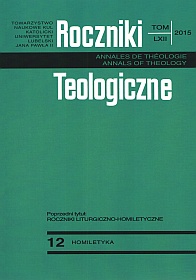Parish Bible Study as a Proposal of Cooperation of Parishioners on Preparation of a Homily
Abstract
Homily should be a space of communication between the Word of God, sacraments and a life of the faithful, who take part in the liturgy bringing their own problems. A preacher has to know a situation of his listeners. That is why he has to contemplate not only God but also his people.Homily, which makes more precise message of the Holy Scripture, helps them to discover the Word of God that is present and effective in their life. Than the preacher can’t focus his attention only on biblical texts, exegesis and a deeper theological meaning, but must recognize people they come to the liturgy as well. Contemporary homiletics cares ofthis, that preachers, apart from good understanding of the Word of God, bother of knowing of a listener, his questions, everything what can makes him troubles and what he is interested in. If not, homilies can be impractical and unrealistic. Among many pastoral forms of knowing of needs of listeners, a weekly meeting of a pastor with his faithful connected to a Bible study deserves an attention. An unusual nature of this method arises due to a recognizing of a situation and their problems by the preacher in a context of a coming Sunday Gospel. The part of the Gospel gets a new interpretation in a light of the existential situation of the faithful. The parishioners, speaking about their life in this context, open before the preacher new ways of making the message of salvation real and precise. “Here and now” of a person or a community enlightens the part of the Bible and vice versa. This method implies their cooperation on a Sunday preaching, becomes a foundation of existential meanings of the homily and has an influence on correct proclaiming of kerygma, explanations, moral and mystagogue.
References
Brzozowski M.: Przepowiadanie homilijne. „Współczesna Ambona” 12:1984 nr 3 s. 166.
Chaim W.: Obecność słuchacza w procesie tworzenia kazania. W: Słuchacz Słowa. Red. W. Przyczyna. Kraków 1998 s. 267-277.
Chaim W.: Kaznodzieja jako terapeuta. W: Sługa Słowa. Red. W. Przyczyna. Kraków 1997 s. 168-169.
Chaim W.: Przepowiadanie dialogowe w małej grupie. „Biblioteka Kaznodziejska” 2(151) 2007 s. 23-36.
Dyk S.: Mistagogiczna natura i funkcja homilii. „Przegląd Homiletyczny” 11:2007 s. 103-111.
Franciszek. Adhortacja apostolska o głoszeniu Ewangelii w dzisiejszym świecie „Evangelii gaudium”. Kraków 2013.
Kriegstein M.: Całościowe kształcenie teologiczne w zakresie „wypowiedzi publicznej i uroczystości kościelnych” – solidarne formy kształcenia. „Przegląd Homiletyczny” 7:2003 s. 25-33.
Kudasiewicz J.: Homilie na święta Pańskie a problem synoptyczny. „Przegląd Homiletyczny” 8:2004 s. 34.
Kudasiewicz J.: Pismo św. w teologii i duszpasterstwie. Rys historyczno-metodologiczny. W: Biblia w nauczaniu chrześcijańskim. Red. J. Kudasiewicz. Lublin 1991 s. 17-47.
Kudasiewicz J.: Proforystyka pastoralna. Pismo św. jako księga ludu Bożego. W: Wstęp Ogólny do Pisma Świętego. Red. J. Szlaga. Poznań 2008 s. 221-275.
Przyczyna W.: Homilia pięćdziesiąt lat po Soborze Watykańskim II. Kraków 2013.
Schwarz A.: Jak pracować nad kazaniem. Warszawa 1993.
Simon H.: Przepowiadanie biblijne. W: Biblia w nauczaniu chrześcijańskim. Red. J. Kudasiewicz. Lublin 1991 s. 49-86.
Siwek G.: Proces tworzenia kazania. W: Fenomen Kazania. Red. W. Przyczyna. Kraków 1994 s. 177-213.
Twardy J.: Aktualizacja słowa Bożego w kaznodziejstwie. Przemyśl 2009.
Twardy J.: Koncepcja pracy twórczej nad kazaniem. Rzeszów 1998.
Zerfass R.: Od perykopy do homilii. Kraków 1995.
Copyright (c) 2015 Roczniki Teologiczne

This work is licensed under a Creative Commons Attribution-NonCommercial-NoDerivatives 4.0 International License.





